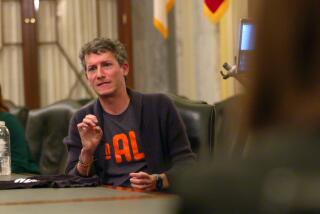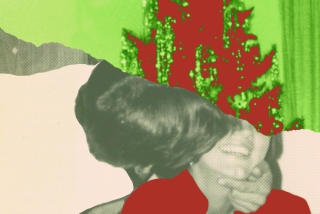My Turn: Patti Davis on the chains that break, the links that form in Alzheimer’s
In 1994, when my father disclosed that he had Alzheimer’s disease, I was living in New York. The news that Ronald Reagan had willingly told the world about his condition was everywhere, and with the familiarity typical of New Yorkers, people would stop me on the street to express condolences or share their own experiences with the disease.
It was the latter scenario that transfixed me. Complete strangers would tell me about their mother or their father, a grandparent or aunt. They would give me a few details, their eyes would brim with emotion, and then they’d be gone. I never saw them again … and I looked for them, because there wasn’t anyone in my life, other than family members, with whom I could discuss the strange, unpredictable journey we were suddenly on.
I knew I was now part of a club — one that no one wanted to be in — but it felt more like the French Underground, secretive and furtive, with messages exchanged on street corners and people vanishing into the mist.
One time, I confided in a close friend that I felt so guilty about having slipped up and asked my father a question, when you aren’t supposed to do that with people who have Alzheimer’s. It confuses them. She was deeply sympathetic yet clearly puzzled about how to respond. There was nothing in her own reality to allow her to identify with what I was going through.
I spoke to my mother on the phone every day, but she was losing her husband, her soul mate, and that is different from a daughter losing her father. My sister Maureen was waging her own battle with melanoma, and my brothers remained stoic and analytical. Each person in a family loses a loved one in his or her own way, fitting to the architecture of their relationship.
So I had to chart my own way across the foreign land of a disease that few people even discussed, one that doctors had no map for. I started a journal, which later became a book, “The Long Goodbye”; I prayed a lot, and I decided that the one navigational tool I had was the belief that my father’s soul didn’t have Alzheimer’s.
I flew back and forth across the country so frequently I was running out of money. I finally returned to California for the last years of his life.
The loneliness of the journey was a constant. There was no one to talk to the first time I realized he had no idea I was his daughter — I said “I love you,” and he looked surprised, as anyone would if a stranger said something so intimate. There was no one to call when my mother phoned me in New York late one night because my father was insisting he had just seen me in their living room and wanted to know where I’d gone. Neither of us could interpret what this meant. Had he hallucinated? Imagined my presence so strongly that he believed it was real?
I knew there were people out there who could empathize and understand; I just didn’t know where they were.
Eighteen years have passed, and Alzheimer’s is no longer a cloaked, secretive disease. But family members still search for someone to talk to. I know, because people come up to me in stores and on the street; the haunted look in their eyes reveals them before they even speak.
They share sad emotions with me and ask questions that burned through me during the long decade of my father’s illness. I do my best to give them the answers I wish I had gotten then. I try to assure them they aren’t alone, that it’s a harsh club we’re in, but there are a lot of us in it.
Recently, I decided that some of us in that club should meet.
One night a week, a group of people who know well the scorched earth that Alzheimer’s leaves behind gather to talk. We bring our stories in with us — stories of loved ones who slip away from us in stages.
Some of us have already said goodbye to the one who died in countless ways before death actually arrived, but the weight of grief is still there, as well as feelings that have been bottled up for years. Others are at earlier stages of the journey. Some are losing a husband or a wife; some, a parent or a sibling.
The details of people’s situations vary, but what bonds us is the knowledge that Alzheimer’s is grief in slow motion. From the first stages of symptoms, we have to start saying goodbye — to small things at first but later to huge swaths of the loved one’s identity — to pieces of their personality, memories and the familiarity of shared history.
We have no control over what vanishes. We keep saying goodbye, month after month, year after year, until we end up sitting silently at bedsides, hoping that love can be felt even when words can no longer be understood.
We’re only a few members of a club that is, sadly, growing larger all the time. We come to help each other across rough terrain. Mostly we come to feel a little less alone.
Beyond Alzheimer’s, a support group for family members, meets 6:30 to 7:30 p.m. Mondays at UCLA/Ronald Reagan Hospital. Facilitators: Patti Davis and Linda Ercoli. Call (310) 825-8253 for information and reservations.
My Turn is a forum for readers to recount an experience related to health or fitness. Submissions should be 500 words or fewer, are subject to editing and condensation and become the property of The Times. Email [email protected]. Read more at latimes.com/myturn.
More to Read
Sign up for Essential California
The most important California stories and recommendations in your inbox every morning.
You may occasionally receive promotional content from the Los Angeles Times.










